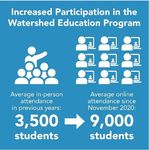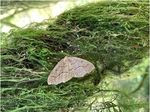LSCR Annual Update 2021 - Information Panels - Metro ...
←
→
Page content transcription
If your browser does not render page correctly, please read the page content below
LSCR Annual Update 2021 – Information Panels
Welcome to our Annual Update!
Metro Vancouver would like to share our highlights from work in the Lower Seymour Conservation Reserve
(LSCR) from 2020 and let you know what we’ve got planned for 2021 and 2022.
In this annual update you will learn about:
• Planning ahead for 2022
• Projects completed in 2020 and upcoming projects in 2021
• The Western Hemlock Looper outbreak in our water supply areas
• How we continued our watershed education programs
Photo caption: The LSCR Seymour DamPlanning Ahead for 2022
With a goal of maintaining the LSCR’s recreation, education, and environmental values, in conjunction with its
capacity as a water reserve, the following five categories guide planning: trail networks, visitor experience,
partnership and stewardship, management and maintenance, and ecosystem management.
Trail Network
• Continue with Dog Mountain Trail upgrades
• Complete Coho Trail bridge replacements
• Replace Rice Lake Loop bridge
• Rice Lake Shoreline upgrades
• Begin Fisherman’s Trail South upgrades
Visitor Experience
• Hold trail etiquette and wildlife safety booths during
spring and summer 2022
• Develop a plan for trail distance markers on high
use trails
• Continue to replace picnic furniture
Partnership and Stewardship
• Organize and hold an open house in spring 2022
• Continue the stewardship program
• Continue to facilitate First Nations engagement
• Ongoing teacher professional development sessions
•
Management and Maintenance
• Continue with trail counter program
• Assess the feasibility for additional parking
Ecosystem Management
• Mitigate tree and habitat impacts on trails
• Continue to close unsanctioned trails to prevent
sensitive ecosystem damage
• Create new interpretive signageCompleted & Upcoming Projects
New bridges completed in 2020
Last year, three bridges were replaced along Coho Trail at Hurry Creek, Flood Creek and Spruce Creek. The new
bridges were constructed with a new design to increase their life span. The replacement work for the bridges
included installing new decking and new steel stringers.
Upcoming Bridge Work in 2021
There will be multiple bridge maintenance, replacements
and construction upcoming in 2021 and 2022. All of these
projects include installing new bridge decking material,
replacing aged materials to increase the lifespan of the
bridges, and upgrading them to the new bridge standard for
the LSCR.
Please see the map below for the bridge work happening in
2021.
Photo caption: Restoration completed on the bridges along
Coho Trail.The Western Hemlock Looper in Metro Vancouver Water Supply
Areas
Since 2018, Metro Vancouver staff noticed defoliation and tree mortality in the three water supply areas as a result
of a Western Hemlock Looper outbreak.
What is Metro Vancouver doing about the Western Hemlock Looper outbreak?
• Monitoring Looper populations through pheromone trapping and aerial surveys
• Commissioning studies to expand monitoring to look at the effects of climate change on forested lands and
the pests that impact them
• Sharing information with other agencies and institutions
• Remote sensing to investigate vegetation changes over time
Facts about the Western Hemlock Looper:
• The Western Hemlock Looper is a commonly-occurring
moth native to the forests of North America
• It’s one of the more destructive defoliators in British
Columbia and feeds on most conifer species, but prefers
mature Western Hemlock
• In the Metro Vancouver region there is typically a large
outbreak every 14-20 years, each lasting for a period of 1-4
Photo caption: The Western Hemlock Looper
years
• Research suggests that although Looper outbreaks can be
dramatic and highly visual, they are not expected to impact
water source quality
• Learn more on the natural cycle of a Western Hemlock
Looper
Photo caption: Damage to the forest surrounding Capilano Reservoir was documented in August 2020 from the
Western Hemlock Looper.Watershed Education Programs and Water Conservation
Virtual Watershed Educations Programs 2020 & 2021
Photo caption: LSCR Interpreters discussing the features of the Coquitlam Watershed
In 2020 and 2021, many of Metro Vancouver’s regularly scheduled watershed education programs for
elementary school students were cancelled due to COVID -19. Staff established a virtual grade 4 and 5 program
to continue education and engagement about our watershed system in a safe and effective way.
About the program:
• It started in November 2020 and will run through June 2021
• It is offered free of charge to schools in the Metro Vancouver region
• It consists of an educator visiting classrooms virtually for a 1-hour active participation presentation that
includes educational videos
• There was a significant increase in participation of school districts that are outside of the traditional
program attendees
If you would like to learn more about the virtual Watershed
Education Program or would like to sign a classroom up,
please email watershed.ed@metrovancouver.orgSnowpack Monitoring in Metro Vancouver Watersheds
Snowpack data is critical for water supply planning, and streamflow and flood forecasting. Since 1936, Metro
Vancouver has been monitoring snow pack in the watersheds to help predict spring/summer water supply. In 2019
and 2020, Metro Vancouver started a project to investigate and test new technologies for improving monitoring
and our knowledge of snow extent and depth within the region’s watersheds.
About the project:
• Two primary technologies are currently being tested for this project: aerial light detection and ranging
(LiDAR) and satellite imagery
• LiDAR and satellite data collected in 2020 have shown promising results in refining snowpack and water
supply estimates
Photo caption: Setting up to measure snow conditions at the Disappointment Lake weather station in the
Coquitlam Watershed in December 2020
Initiatives like the snowpack monitoring program contribute to Metro Vancouver’s goal of having more reliable
water supply results and helping with water supply planning as well as climate change monitoring. In 2020, Metro
Vancouver released the Water Supply Outlook 2120 to evaluate water supply options that could be developed to
ensure a reliable future supply of high-quality drinking water.COVID-19 Measures in the Lower Seymour Conservation Reserve Throughout the year as we adjusted to COVID-19, the LSCR remained open, providing an important outlet for residents to enjoy the outdoors. Metro Vancouver thanks visitors for being mindful of physical distancing, particularly in our busier areas. Metro Vancouver’s paramount commitment is to maintain critical services to the region while protecting the health and safety of our employees, our partners and the public. If you plan to visit the LSCR this summer, please respect all COVID-19 protocols.
You can also read



























































